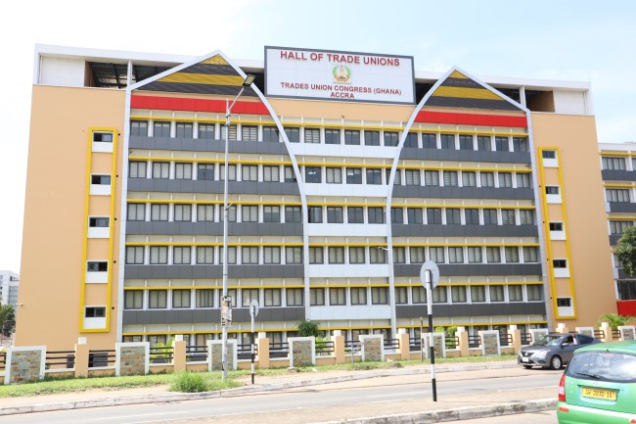The Deputy Secretary-General of the Trades Union Congress (TUC), Joshua Ansah, has called on government to clarify its position on the freeze on government sector employment.
According to him, the wording of the policy proposition in the 2023 budget is ambiguous, thus, should be detailed for better clarification.
He was referring to the government’s freeze on all public sector employments except under very critical conditions.
Reacting to the statement, he questioned what could be considered very critical condition, and added that the freeze was a total freeze on employment, not a net freeze like in the 2015 IMF programme where government could employ to replace exiting public sector workers.
Speaking on JoyNews’ PM Express, he stated that it is because of situations such as this that the TUC has been a vehement campaigner against government going to the IMF.
“So government has gone into this IMF programme and lo and behold, the freezing of employment in the public and civil service sectors have come to being. This is a complete total freeze on employment unlike the previous one where it was a net freeze.
“But who determines what is critical? Who determines what is critical in this very country? So it’s a complete total freeze and we’re expecting that details and meaning of that total freeze must come,” he said.
He added, “Yesterday, the TUC held it’s discussions on… we actually digested the budget at a meeting and there was no detail about the freeze, whether it’s a net freeze or half freeze or whatever. So all what has appeared in the budget statement is that there is a total freeze on employment in 2023 which the TUC opposes vehemently because it’s going to have very negative effects in this very country.”
He expressed grave concern about the situation this total freeze would create during the period Ghana remains under the IMF programme.
According to Joshua Ansah, with Ghana’s public sector amounting to about 700,000 workers including healthcare providers and teachers etc servicing a national population of about 30miilion people, this could put a strain on public service in the near future.
“Ghana is over 30million+ and only 700,000 people like the doctors, nurses, teachers and the people you mentioned in your intro are the people who are providing services to the 30million+ people in this very country. So if the government says its freezing employment in 2023, we can guess what is going to happen in 2023.
“Assuming if even one or two percent of this total 700,000 workforce resigns or retires or by some reasons leave the job, what is going to happen to the public sector services? It means our services is going to be affected. So the total freeze on employment is totally unacceptable and we are highly disappointed about this programme that has come,” he said.
Latest Stories
-
Trinity Oil MD Gabriel Kumi elected Board Chairman of Chamber of Oil Marketing Companies
33 minutes -
ORAL campaign key to NDC’s election victory – North America Dema Naa
52 minutes -
US Supreme Court to hear TikTok challenge to potential ban
57 minutes -
Amazon faces US strike threat ahead of Christmas
1 hour -
Jaguar Land Rover electric car whistleblower sacked
2 hours -
US makes third interest rate cut despite inflation risk
2 hours -
Fish processors call for intervention against illegal trawling activities
2 hours -
Ghana will take time to recover – Akorfa Edjeani
2 hours -
Boakye Agyarko urges reforms to revitalise NPP after election defeat
3 hours -
Finance Minister skips mini-budget presentation for third time
3 hours -
‘ORAL’ team to work gratis – Ablakwa
3 hours -
Affirmative Action Coalition condemns lack of gender quotas in Transition, anti-corruption teams
3 hours -
December 7 election was a battle for the ‘soul of Ghana’ against NPP – Fifi Kwetey
3 hours -
Social media buzzing ahead of Black Sherif’s ‘Zaama Disco’ on December 21
3 hours -
Afenyo-Markin still suffering from the massive defeat – Fifi Kwetey
3 hours

